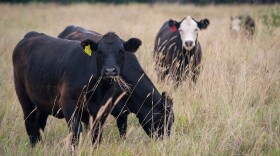John Sharp sent Harvard’s president an open letter calling for an investigation into Harvard scientists whose actions he said “are false and harmful to Texas A&M University and its faculty.”
Editor's note: This story has been updated to clarify that a Texas A&M researcher received funding from a beef industry-backed program for research separate from the study on the risks of eating red meat.
Texas A&M University System Chancellor John Sharp called out Harvard on Wednesday after some Harvard faculty alleged that Texas A&M food scientists are beholden to the beef industry.
Sharp fired back with an open letter urging Harvard University President Lawrence S. Bacow to investigate faculty who he says “mischaracterized scientific research and falsely accused Texas A&M scientists of selling out to industry interests.”
The accusations against scientists at A&M — the leading agriculture school in the nation's largest beef-producing state — coincide with an emerging scientific dispute over the health benefits of curtailing meat consumption. And A&M is pushing back hard in defense of its researchers.
The conflict stems from a controversial study published in September in the Annals of Internal Medicine that downplayed the risks of red meat. The study drew harsh criticism after it was revealed that the lead author failed to disclose that he'd received funding for other research from an A&M program backed in part by the beef industry.
According to Sharp, Harvard faculty associated with an organization called the True Health Initiative attempted to discredit the study because they disagree with its findings.
“Several of your faculty are involved as council members or advisers of THI and collaborated with THI in their effort to discredit scientific evidence that runs contrary to their ideology,” Sharp wrote. “I can assure you that Texas A&M’s research is driven by science. Period.”
But in a recent article published on its website, THI — which describes itself as a “global coalition of world renown experts, fighting fake facts and combating false doubts to create a world free of preventable diseases” — said backlash over the beef study “spotlighted unreported funding by the meat industry” and called it “another assault on public trust in nutrition science — which perhaps was the authors’ goal all along.”
Harvard and the Truth Health Initiative did not immediately respond to requests for comment. At press time, a spokesperson for A&M said a Harvard representative called Sharp regarding the letter, but Sharp and Bacow have yet to speak directly. A Harvard spokesperson confirmed that Sharp's letter had been received.
Sharp also accused the Harvard faculty of using “unethical” tactics to push back against the original red meat study, such as “using automated bots to flood the email inbox” of the editor-in-chief of the journal that published it.
“Their actions are unethical, distort the results of important scientific research, and, in our opinion, are false and harmful to Texas A&M University and its faculty,” Sharp wrote.
To correct the matter, Sharp urged “a serious assessment by Harvard of its affiliation with THI and a comprehensive ethical review into any Harvard faculty involved with THI.”
“Texas A&M asks that Harvard join us for a purely scientific approach to nutrition for the sake of public health and public trust and reject the politics and unethical actions of THI that have sought to discredit science and interfere in the scientific process,” Sharp wrote.
Disclosure: The Texas A&M System has been a financial supporter of The Texas Tribune, a nonprofit, nonpartisan news organization that is funded in part by donations from members, foundations and corporate sponsors. Financial supporters play no role in the Tribune's journalism. Find a complete list of them here.







